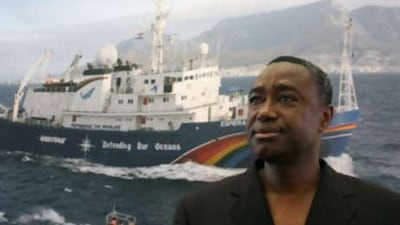JOHANNESBURG // When Amadou Kanoute was growing up in the village of Goudiry, in eastern Senegal, he remembers a rich landscape of fruit trees and verdant fields, fed by a gently flowing river. Decades later, he says, drought and desertification have wreaked havoc. "That river has dried up. I used to go there to fish. It was so green, all these trees, fruit trees, the maize and so on. It was a delight for the eyes. Now it's just going brown," he said. Food used to be plentiful, but now the residents pin their hopes on two months of unreliable rain a year. "It's just incredible when you go there, there is so much sadness and lack of hope I can read in the people's faces and behaviour. This could be the story of any African of my generation." Mr Kanoute's story is hardly that of a typical African, though. At 52, he is now a seasoned campaigner, having risen through the ranks of a series of NGOs to become the executive director of Greenpeace Africa, with the transformation of Goudiry being one of the reasons for him to become an environmentalist. The high-profile organisation, renowned for its use of media-friendly stunts to raise the profile of its causes, has just opened its first permanent office on the continent, in Johannesburg, with more to come in Kinshasa, in the Democratic Republic of Congo, and Dakar in Senegal. Africa has long been the scene of environmental problems and Greenpeace has and is campaigning there, but Gerd Leipold, the head of Greenpeace International, said the continent's rising strategic profile was as much a reason for the move. "If you look at the global political map we have seen huge change, I think we will see increasing importance of the African continent," he said, citing the role of South Africa - one of the world's biggest coal consumers - as well as China, India and Russia in climate change negotiations. "We as an organisation want to be present where the more important and the future players will be. "Africa is one of the continents which will be worst hit by the climate crisis; coming to Africa is to say this is where the problems are most acute, this is where we need to be." Greenpeace Africa will concentrate in three areas - climate change, deforestation in the Congo basin and overfishing off West Africa. But its next major action illustrates the challenges any environmentalist faces in a continent where hundreds of millions of people live in grinding poverty, wars and insurgencies are more common than anywhere else and short term survival is the priority. This month, the Arctic Sunrise, one of Greenpeace's three ships, will steam up the Congo river to highlight logging in the region. "The Congo rainforest is the second largest rainforest on Earth after the Amazon and it also plays a vital role in regulating the global climate," said Mr Kanoute, adding that deforestation creates one-fifth of all greenhouse gas emissions, more than the world's international transport sector. "Wealthy foreign companies pay local communities in bags of salt, machetes and crates of beer for forest access that earns them millions of dollars." At the same time, though, the Congolese government is fighting a war in the east of the country against Laurent Nkunda's rebels that has displaced hundreds of thousands of people and threatens to draw in several countries to what could become a regional conflict. As an advocate for an ideological group - which he admitted was once a "white, northern-based organisation" - Mr Leipold is adept at framing the dilemma in a certain viewpoint. "It's a mistake to assume people in war are only interested in war," he said. "Sometimes the wars are very closely linked to environmental issues, sometimes they are linked to exploitation of mineral resources? Our message of 'We need to live differently, we need to challenge our lifestyle', you can see it's a response to these wars. We make the connection between consumption of richer societies with conflict in poorer countries." The potential for a trade-off between environmental protection and economic growth gets similarly short shrift from Mr Kanoute. Some militant environmentalists espouse zero-growth models, but such principles would condemn generations of Africans to remain mired in poverty, and the continent's enormous mineral wealth is seen by many economists as its best hope for improved prosperity, even though so far its fruits have been largely confined to elites. Greenpeace, the Senegalese said, "is not a poverty alleviation organisation". Its commitment is to saving the planet, but poverty is a recurrent theme in its campaigns. "We believe that these two things are not necessarily contradictory," he said sberger@thenational.ae

Continent gets green boost
NGO plans to focus on fishing, deforestation and climate change across nations, which are battling insurgencies and grinding poverty.
Most popular today
5
